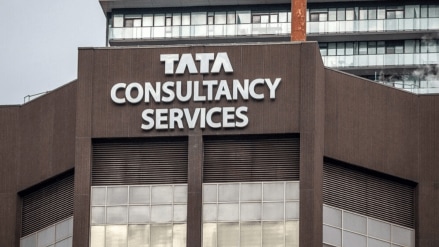The Tata Consultancy Services (TCS) share price is under pressure after the Q2 resuts announcement. Though operating margin improved to 25.2% and the company generated operating cash flow equal to 110% of its net profit,indicating liquidity discipline, international brokerage house Jefferies isn’t convinced. In its note dated October 9 the brokerage maintained a “Hold” rating on TCS, trimming FY26–FY28 profit estimates by up to 1%.
The problem, according to Jefferies, wasn’t execution, it was trajectory. Jefferies called this a “weak growth phase with limited upside,” arguing that TCS’s much-publicised data centre expansion, a Rs 40,000–50,000 crore capital bet, might not move the needle meaningfully.
Jefferies on TCS: The data-centre – a buzz or modest arithmetic
TCS announced that it will build a 1 gigawatt data centre by FY31. That sounds large. It is large. But size alone does not equal profit.
Jefferies pointed out that the “move does not materially change TCS’ growth profile since it is at full potential in FY31,”
Jefferies ran the arithmetic. It estimates the investment required at about $5–6 billion (Rs 41,500 – 49,800 crore). Even if the business runs at scale, Jefferies modelled annual revenue of about $1.2 billion (Rs 8,900 crore) by FY31. Jefferies therefore concluded this adds only around 0.6% extra revenue growth per year to TCS over FY25–FY31.
Expansion in data centres could reduce cash flow: Jefferies
Jefferies pointed out that the setting up of data centres “entails physical infrastructure leasing business with little relationship to TCS’s existing IT service business.” Moreover, it is a capex-heavy (Rs40-50m/MW), low return on capital employed (8-12%) business, quite the opposite of TCS’s current business. They believe, “this may need TCS to take a very different approach to successfully scale this up.”
While peers like Infosys and HCL Tech push deeper into AI-led projects and hyperscaler partnerships, TCS is preserving capital. Its Rs 1,02,850 crore in retained earnings and Rs 13,585 crore in property, plant and equipment indicated that conservatism, as per the company’s balance sheet data.
The character of this growth, however, has shifted. Jefferies observed that more of TCS’ revenue now comes from maintenance and support work, rather than high-value transformation projects. In short, TCS is earning better from what it already does, not from new ground it’s breaking.
Jefferies’ target price for TCS
At around Rs 3,000 levels apiece, TCS trades at roughly 21x forward earnings a fair price for a company with strong cash flow but modest growth. Jefferies’ target of Rs 3,100 with a ‘Hold’ rating implied little immediate upside.
TCS remained a high-quality cash generator with strong margins and a healthy balance sheet, cash and bank balances of Rs 6,358 crore and investments of Rs 38,829 crore, according to the consolidated interim statement.
Yet the firm’s growth engine is idling, claimed Jefferies. The data-centre plan is large, and it matters for capital allocation, but the brokerage’s analysis showed it is unlikely to shift the growth trajectory materially.
Attrition rate: Not a good sign for near-term growth
Nowhere does the strain show more clearly than in people. The company reports a closing headcount of 5,93,314 for Q2 FY26, down 19,755 from the prior quarter roughly a 3% QoQ decline, recorded in the fact sheet as per the company’s Q2 FY26 fact sheet.
Jefferies emphasised this as a risk, “The 3% QoQ decline in headcount does not bode well for near-term growth,” the note states.
TCS said that it’s focusing on reskilling and productivity improvements, which means it’s training existing staff to handle more work through technology. But the company’s disclosures don’t show whether this efficiency gain is enough to fully replace the loss of manpower.
